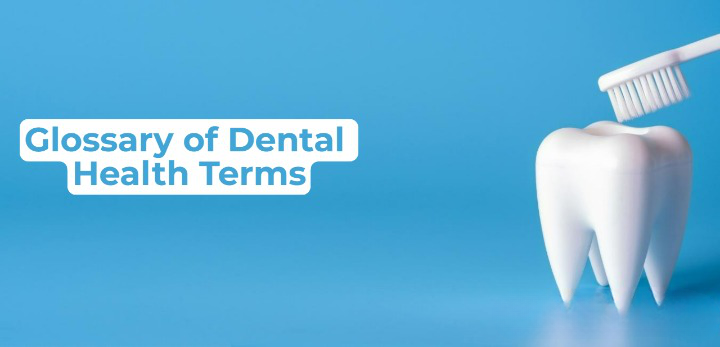When it comes to dental health, there are many terms that can be confusing or unfamiliar to many people. Understanding the terminology is essential for maintaining good oral hygiene and communicating effectively with dental professionals. In this glossary, we will define and explain 50 common dental health terms.
A
- Abrasion
- Tooth wear caused by improper brushing or excessively forceful use of toothpicks or floss. Holding objects between the teeth or frequently placing and removing a dental appliance may also cause abrasion.
- Abutment
- Tooth or teeth on either side of a missing tooth that support a fixed bridge or removable partial; also refers to a piece of metal or porcelain that is screwed on to an implant to allow a crown to be glued on.
B
- Bonding
- A dental procedure that uses a tooth-colored material to repair or improve the appearance of teeth.
- Braces
- Dental devices used to straighten teeth and correct bite problems.
- Bridge
- A dental appliance used to replace one or more missing teeth.
C
- Canine teeth
- The pointed teeth next to the incisors.
- Canker sore
- A painful sore in the mouth.
- Cavity
- A hole in the tooth caused by tooth decay.
- Cleaning
- A dental cleaning, also known as prophylaxis, involves removing plaque and tartar from teeth to prevent tooth decay and gum disease.
- Composite filling
- A tooth-colored filling made of resin that is used to repair a decayed or damaged tooth.
- Crown
- A dental restoration that covers and protects a damaged tooth.
D
- Dental floss
- A thin thread used to clean between teeth
- Dental implant
- A surgical component used to replace missing teeth.
- Dental pulp
- The soft tissue inside a tooth that contains nerves and blood vessels.
- Denture
- A removable appliance used to replace missing teeth
E
- Enamel
- The hard, outer layer of a tooth that protects it from damage and decay
F
- Filling
- A dental restoration used to repair a cavity or other damage to a tooth.
- Fluoride
- A mineral that helps prevent tooth decay.
G
- Gingivitis
- A mild form of gum disease characterized by redness, swelling, and bleeding of the gums.
- Gum disease
- An infection of the gums and bones that support teeth.
H
- Halitosis
- Bad breath
I
- Impacted tooth
- A tooth that is blocked from coming in or erupting
- Invisalign
- A type of clear aligner used to straighten teeth
M
- Molar teeth
- The back teeth used for grinding and chewing
- Mouthguards
- Protective devices worn over teeth to prevent injury during sports or other physical activities.
N
- Nerve
- A bundle of fibers that transmit signals to and from the brain.
O
- Oral cancer
- Cancer that develops in the mouth or throat.
- Orthodontics
- A branch of dentistry that focuses on correcting misaligned teeth and jaws.
P
- Partial denture
- A removable appliance used to replace one or more missing teeth.
- Periodontal disease
- A more severe form of gum disease that can lead to tooth loss and other serious health problems.
- Periodontist
- A dentist who
Q
- Quackery
- Deceptive or fraudulent practices in medicine or dentistry.
R
- Radiograph
- A photographic image produced by an X-ray used to diagnose oral health issues.
- Root canal
- A dental treatment that involves removing the infected pulp from the root canal of a tooth.
S
- Scaling
- The process of removing tartar and plaque buildup from the teeth, usually done by a dentist or dental hygienist.
- Sealant
- A protective coating applied to the chewing surfaces of molars and premolars to prevent cavities.
- Sensitivity
- Tooth sensitivity is the discomfort or pain experienced when consuming hot or cold foods and drinks.
- Splint
- A device used to stabilize loose teeth or to hold teeth in place after a dental procedure.
T
- Tartar
- Hardened plaque that has built up on teeth and can lead to gum disease.
- Temporomandibular joint (TMJ)
- The joint connecting the jawbone to the skull, responsible for opening and closing the mouth.
- Tooth decay
- The breakdown of tooth enamel and dentin caused by acid produced by bacteria in plaque.
- Tooth extraction
- The surgical removal of a tooth from the socket in the bone.
U
- Ultrasonic cleaning
- A dental cleaning method that uses high-frequency sound waves to remove tartar and plaque from teeth.
- Underbite
- A dental condition where the lower jaw protrudes beyond the upper jaw, causing misalignment of the teeth.
- Universal numbering system
- A system used by dentists to identify teeth by a number from 1-32, starting from the upper right molar to the lower right molar.
V
- Veneer
- A thin, custom-made shell placed over the front of a tooth to improve its appearance.
- Vertical dimension
- The distance between the upper and lower jaws when the teeth are in contact.
- Vestibule
- The area between the lips or cheeks and the teeth and gums.
W
- Whitening
- A dental procedure used to lighten the color of teeth using a bleaching agent.
- Wisdom teeth
- The third set of molars that typically emerge between the ages of 17-25
X
- X-ray
- A type of radiation used to produce images of the teeth, bones, and soft tissues in the mouth.
Y
- Yellow teeth
- Teeth that have become discolored due to aging, smoking, or consuming certain foods and drinks.
Z
- Zirconium
- strong and durable metal used to make dental crowns and bridges.


